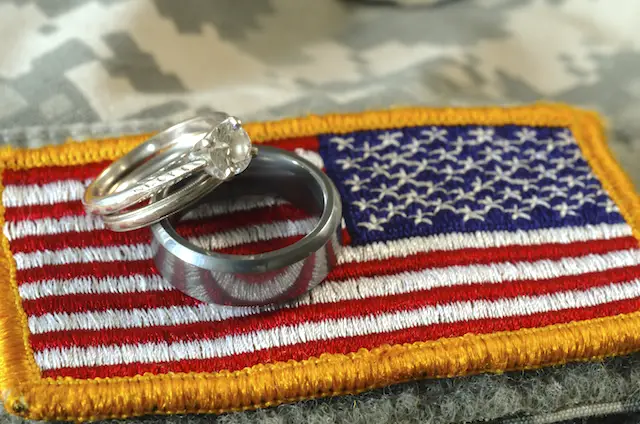A friend of mine recently married an active duty service member and suddenly found herself with several new excellent benefits available for her to utilize, but also some confusing decisions to make as well.
What was this new Tricare program being offered to her, and which plan was the best one for her and her family? What was required for her to gain access to the military base to take advantage of these new benefits?
If you are a new spouse of an active duty service member, you may be facing these decisions as well. My friend was kind enough to share her experience with me in the hope it would help others who may find themselves in this exciting but confusing situation.
Disclaimer: The information in this article is unique to my friend’s experience and will not necessarily be the same for others. Be sure to consult with an expert to find the details and benefits options that apply in your situation.
Background checks and DEERS enrollment
The first step my friend had to take as a new military dependent was to sign up for the Defense Enrollment Eligibility Reporting System (DEERS). She said that when she went through the sign up process, she had to go onto the local military base to complete some paperwork.
This became a much more complex process than she was expecting.
The first puzzling scenario she ran into was getting onto the base. She said that when she was a passenger in the car with her husband (and even before they were married), they could go right onto the base and the security guards would check her driver’s license but didn’t question her presence in the car.
When she went onto the base by herself to enroll in DEERS, she suddenly found the security became much tighter.
She first had to get a dependent card (a spousal military ID) and then be put into the DEERS system to be granted access to the military base then and in the future.
The first step of this process was to complete the necessary paperwork and have a background check conducted before she was granted access onto the base. Although she arrived well in advance of her appointment, she had no idea the process would take as long as it did or how in depth the process would be.
She was not told that a background check was being conducted (or that it was even required to get onto the base), and only found out about it when somebody came to let her know that there were some delays with the background check which is why it was taking so long (the entire process to gain access to the base ended up taking an hour).
Tricare
After finally gaining access to the military base and completing the DEERS enrollment process, next came another new benefit: Tricare. While she had heard of the program before, suffice it to say she knew very little about it. What options were available to her, and which option would ultimately best suit her needs?
My friend told me that she learned that there were two options in her situation: Tricare prime and Tricare standard, the latter of which was the default option for new military dependents.
She said she had been put into Tricare standard as a part of the DEERS enrollment process she had completed previously. She had the option of upgrading to Tricare prime later if she chose to do so.
Because she was planning to go onto to Tricare prime, she called Humana Tricare, the provider for the program, to upgrade and also ask some questions about it.
She said that the person she spoke with there was extremely helpful and went out of his way to answer her questions and make sure she understood the differences between the programs. In fact, because of his help, she learned some important differences between the two Tricare programs.
Under Tricare prime, she discovered that she would be limited to going to one specific military base on the opposite end of town for any medical services she needed.
Under Tricare standard, however, she could go to any doctor that she wanted, but it did have a higher deductible ($1,000) versus no deductible under prime. Preventative care was covered for her, but if she were to get sick, she would have to pay the full amount of any doctor visits until she reached the deductible whereas Tricare prime only charged a copay for doctor visits.
When she found out these important differences, she ultimately decided to stick with Tricare standard.
Other benefits
Thanks to being enrolled in DEERS and getting the dependent ID, my friend now could get onto the local military bases any time as well as shop at the local Navy Exchange and the Commissary. The Commissary is essentially an on-base grocery store with good discounts beyond prices at regular grocery stores, and the Navy Exchange is a discounted retail store that sells everyday products such as clothes, shoes, electronics, or home appliances.
If you are a new dependent of an active duty military member, you will be able to take advantage of some great benefits, but the process for getting on board with them can be confusing and even time consuming. Be sure to ask any questions you have to learn what is expected of you and to understand which options will ultimately be the best ones for your situation.


